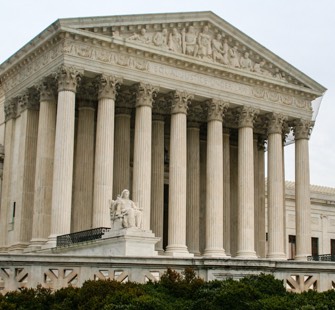Supreme Court decides Oil States
 The United States Supreme Court recently decided Oil States v. Greene’s Energy, which asked whether post-grant challenges to issued patents at the Patent Trial and Appeal Board (PTAB) of the United States Patent and Trademark Office (USPTO) are constitutional under Article III and the Seventh Amendment of the U.S. Constitution. In a 7-2 decision, the Court found that inter partes review (IPR) challenges are constitutional.
The United States Supreme Court recently decided Oil States v. Greene’s Energy, which asked whether post-grant challenges to issued patents at the Patent Trial and Appeal Board (PTAB) of the United States Patent and Trademark Office (USPTO) are constitutional under Article III and the Seventh Amendment of the U.S. Constitution. In a 7-2 decision, the Court found that inter partes review (IPR) challenges are constitutional.
The Trump Administration argued that patents are a government franchise, and that is, in fact, what the Supreme Court ruled. Indeed, Justice Thomas, writing for the majority, said that all inter partes review involves is “reconsideration of the Government’s decision to grant a public franchise.” Thus, patents are not property rights despite what the statute says to the contrary, and despite the fact that the Supreme Court themselves have ruled to the contrary previously.
U.S. Argues Patents are a Public Right in Oil States
In going through the Department of Justice brief in Oil States, you will find no fewer than seven different places where the government makes the argument that patents are a public right, and not private property as they are ordinarily considered. This is interesting because the patent statute itself refers to patents as having all the same attributes of personal property, and at various times the Supreme Court has themselves equated patents to real estate.
Notwithstanding, the Federal Government argues patents are a public right throughout its Oil States brief, as shown from the passages that follow:
DOJ Oil States brief at pg. 13
The justification for patents is not that an inventor has a natural right to preclude others from making or using his invention, but that patent protection will ultimately benefit the public by providing an incentive to innovate. Governmentally-conferred franchises designed to serve such purposes create “public rights,” whose scope and continuing effectiveness may be resolved by non-Article III tribunals.
03.1.18 | Patent Issues, Supreme Court Cases | Gene Quinn
SCOTUS takes IPR constitutionality challenge in Oil States
 To the surprise of many, the United States Supreme Court has granted certiorari in Oil States vs. Greene’s Energy Group, et al. From a substantive standpoint, this dispute is between the parties to an inter partes review (IPR) proceeding conducted by the Patent Trial and Appeal Board (PTAB). By taking this case, the Supreme Court will address the constitutionality of having an Article I tribunal extinguish patent rights under the post grant proceedings created by the America Invents Act (AIA).
To the surprise of many, the United States Supreme Court has granted certiorari in Oil States vs. Greene’s Energy Group, et al. From a substantive standpoint, this dispute is between the parties to an inter partes review (IPR) proceeding conducted by the Patent Trial and Appeal Board (PTAB). By taking this case, the Supreme Court will address the constitutionality of having an Article I tribunal extinguish patent rights under the post grant proceedings created by the America Invents Act (AIA).
The Supreme Court granted certiorari only on the first question presented: “Whether inter partes review – an adversarial process used by the Patent and Trademark Office (PTO) to analyze the validity of existing patents – violates the Constitution by extinguishing private property rights through a non-Article III forum without a jury.”
The grant of certiorari in this case is particularly noteworthy given that the United States was asked by the Supreme Court for its views and opined in its brief that the petition should be denied.
The argument that inter partes review is unconstitutional can be traced back all the way to 1898 when the Supreme Court issued its decision in McCormick Harvesting Mach. Co. v. Aultman & Co., 169 U.S. 606 (1898). In that case, the Supreme Court held that once a patent is granted, it “is not subject to be revoked or canceled by the president, or any other officer of the Government” because “[i]t has become the property of the patentee, and as such is entitled to the same legal protection as other property.”
The phrasing of the question taken by the Supreme Court could be quite telling. Over the last several years, 8 of the 9 Supreme Court Justices have signed on to an opinion that has recognized that a patent confers either an exclusive or valuable property right. Thus, it would hardly seem a stretch to suggest that the Court, or at least the required four Justices necessary to take a case, have some reason to suspect that the extinguishing of a exclusive, valuable property through a non-Article III forum without a jury violates the Constitution.
While many will undoubtedly have varied opinions as to the importance of this decision by the Court to take this case, the truth is that any decision by the Supreme Court in Oil States simply cannot make things any worse for patent owners. The PTO already considers patents to be a public right, and post grant challenges, particularly inter partes review and covered business method review, are killing patent claims at exceptionally high rates.
This case will be argued during the October 2017 term, with a decision by the end of June 2018. In the coming months there will be much more analysis as the party briefs and amici are filed. Stay tuned.
For instant industry reaction please see: Industry Reaction to SCOTUS Granting Cert. in Oil States.
06.22.17 | Inter Partes Review, Patent Issues, posts, Supreme Court Cases | Gene Quinn


No Comments
05.9.18 | Patent Issues, Supreme Court Cases | Gene Quinn